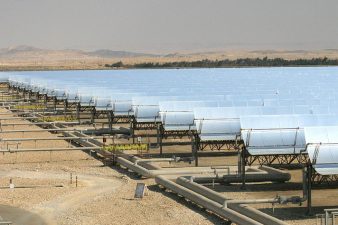 Hobnobbing: Green Prophet attends a new UK-Israeli tech hub hosted at the house of UK Ambassador Matthew Gould. With the UK’s help, Israel can accelerate more clean tech innovation.
Hobnobbing: Green Prophet attends a new UK-Israeli tech hub hosted at the house of UK Ambassador Matthew Gould. With the UK’s help, Israel can accelerate more clean tech innovation.
The UK is making a bid to leverage investment in Israeli tech start-ups. Ambassador Matthew Gould has launched a Tech Hub in Tel Aviv. This endeavor will foster the growth of Israeli companies in their nascence and connect them to markets in London.
Israel has made a name for itself in recent years for its innovation in emerging fields such as biotech, telecommunications and cleantech. In the book “Start-up Nation,” Dan Senor and Saul Singer discuss how “Israel has beaten the odds to become a major player in the global business world, especially in the technology sector.” They explain that the country has achieved this “economic miracle” notwithstanding its decades-long regional conflict and lack of natural resources. And entrepreneurs there are just getting started.
Many of Israel’s innovations have benefited the environment while building profit, which is of great interest to investors and supporters of green technology.
For example, Israel pioneered a type of drip irrigation technology that is widely used throughout the world. This system dramatically reduces the water needed for crops by slowly releasing “drips” in amounts plants can accumulate.
Another important recent development is Orion Solar’s (now known as 3GSolar) nanotechnology solar panels. Unlike current solar panels, 3GSolar’s version uses nano-sized cells, coated with an organic dye engineered to react when hit by sunlight. The process could generate energy more efficiently and cost-effectively than conventional systems.
The cleantech companies I met:
Several start-ups were in attendance recently during a cocktail reception at the Ambassador’s home. TaKaDu, in the water sector, provides a Software-as-a-Service solution for monitoring water distribution networks. This unique approach, which gives water utilities real-time control over network events, could help locate leaks, bursts, zone breaches and other network inefficiencies.
InnoSave uses an energy saving drive that saves energy in industrial motors. Companies that use large motors for concrete mixers, elevators, fans and other machines can install the device and realize up to 50% reductions in energy use, according to Innosave. This technology has the potential to both reduce emissions and increase profits, making it particularly attractive.
So what accounts for this extraordinary innovation in such a tiny, embattled country? First, Israel has the highest number of engineers in the world as a percentage of its workforce. And Israeli scientists publish more articles per capita than any other country. Many engineers learned their trade in Israel’s highly sophisticated military.
The government makes its own efforts to assist the extraordinary start-up growth. Several agencies, including the Ministry of Industry, Trade & Labor and the Israel Export & International Cooperation Institute, offer grants, loans and tax benefits. The government has enthusiastically supported and funded “Start-up Incubators,” making technological innovation a reality for many fledgling companies.
Israeli companies benefit from the country’s economic ties with the world’s biggest economic powers and trading blocs. And investors are never in short supply. Over 150 venture capital firms operate in Israel. In 2005 alone those firms invested $1.2 billion in Israeli start-ups.
These factors have led to the current tech boom in this seemingly underdog country. And the UK has been paying attention. Most Israeli start-ups have understandably flocked to Silicon Valley. That region may have the highest concentration of capital and technological expertise in the world.
But the British government would like to level the playing field. In a recent interview, David Willetts, Minister of State for Universities and Science, sang his country’s praises. He cited Britain’s network of venture capital firms, concentration of outstanding universities, and top-notch financial and legal services. Willetts downplayed the prospect of Israeli economic boycotts in his country, saying simply that Israeli companies are “warmly welcome” in the UK.
The world has quickly realized that green technologies are good for the environment and good for business. It seems that with Western countries competing to invest in Israeli tech startups, their growth isn’t likely to slow anytime soon.



